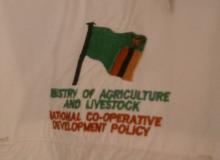Co-authored by Birthe Pater
In September 2011, the Zambians voted for change - a new government led by President Michael Sata from the Patriotic Front (PF). Michael Sata was well known as the ‘China basher’ in his first election campaign in 2006, which culminated in threats of an earlier Chinese ambassador to cut ties with Zambia, if Sata becomes the new president. At that point, Sata promised to recognize Taiwan as an independent country. He failed to win the election and toned his rhetoric down in the second run. But still, one pillar of Sata’s election campaign in 2011 was promises in favor of workers – job creation and paving roads. Although security standards and labor conditions increased in the mines in general, the ‘Chinese’ mines still challenge these improvements.
Though, the cooperation between Zambia and China continues and Michael Sata seeks further direct investments by China; the populist criticism continues. In general, Zambia follows a state regulated economy, which tends to be increasingly interventionist. After a long phase of privatization and market friendly economic policy the new government puts more emphasize on labor rights. One popular example is the revoking of the Chinese-owned Coal mine due to safety lapses in the beginning of 2013. Hence, Sata is nicknamed as ‘King Cobra’ for his sharp tongue towards investors in Zambia: In October 2013, the government threatened to shut down the South African Shoprite stores after they fired 3,000 workers, who went on strike over pay. Furthermore, Chinese road constructors received a public provocation to hire more Zambians and the list continues toward various foreign investors: Vedanta Resources (London-listed), First Quantum Minerals (Canada), Glencore (Swiss), etc.
While working rights appear to be a useful narrative in daily politics, behind the scenes, we have learned from our interviewees that long-term economic policy strategies are developed to diversify the economic boom which heavily relies on foreign investments. To build on earlier successful economic structures, a valuable approach appears to be Zambians long traditions of Co-operatives. They are the third largest employer in the country after the government and the mining business, mainly in sectors such as transport, garbage and agriculture. A recent directive by the Zambian Minister of Agriculture and Livestocks, Robert Sichinga, led to the important and innovative project of revamping the Cooperative Movement companioned by the new National Co-operative Development Policy. We learned that the Zambian Co-operatives Federation (ZFC) is invited with two other stakeholders, the Department of Co-operatives at the Ministry of Agriculture and the Livestock and the Co-operative College in Lusaka, to develop and implement the new strategy. It aims at verifying and categorizing the 32,000 registered Co-operatives to gain an overview of operational and non-operational Co-operatives. The ‚...Co-operative Societies with over 3,000,000 individual members which represents 1 in every 4.3 persons in Zambia been a Co-operator out of a total national population of 13,000,000.’ (quote DRAFT STRATEGIC PLAN).
Logo of the Ministry of Agriculture, Simone Claar
The collaboration with the Japanese, as an economy which runs a valuable system of co-operatives, appears to be an added value for Zambia. Japan International Cooperation Agency (JICA) cooperates with the Ministry of Agriculture and Livestock to improve the life quality of local small-scale farmers in the Rural Extension Service Capacity Advancement Project (RESCAP) in the Northern, Western and Lusaka Province. JICA estimated 1.51 Mil. US$ over a period of five years. As we learned, Japanese co-operation can be characterized by their capacity and ability to locate their projects in hardly accessible rural areas, which need higher investments.
Nevertheless, the renewal of the co-operatives is a turnaround in the economic policy strategy with a great potential to organize people on the ground and supplement the financial and political weaknesses of a decentralized local government. Generally, the new development national plan of the ruling party indicates economic diversification from mining as an important venture.






